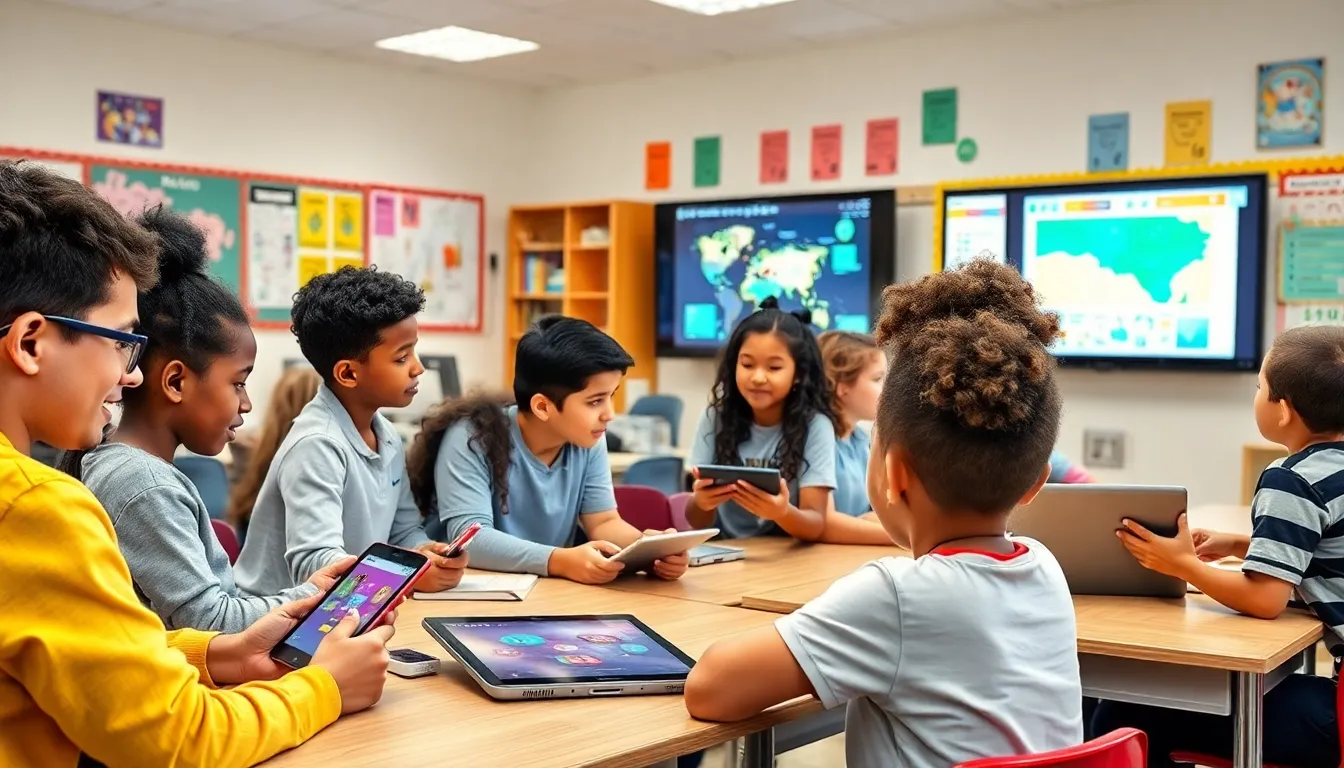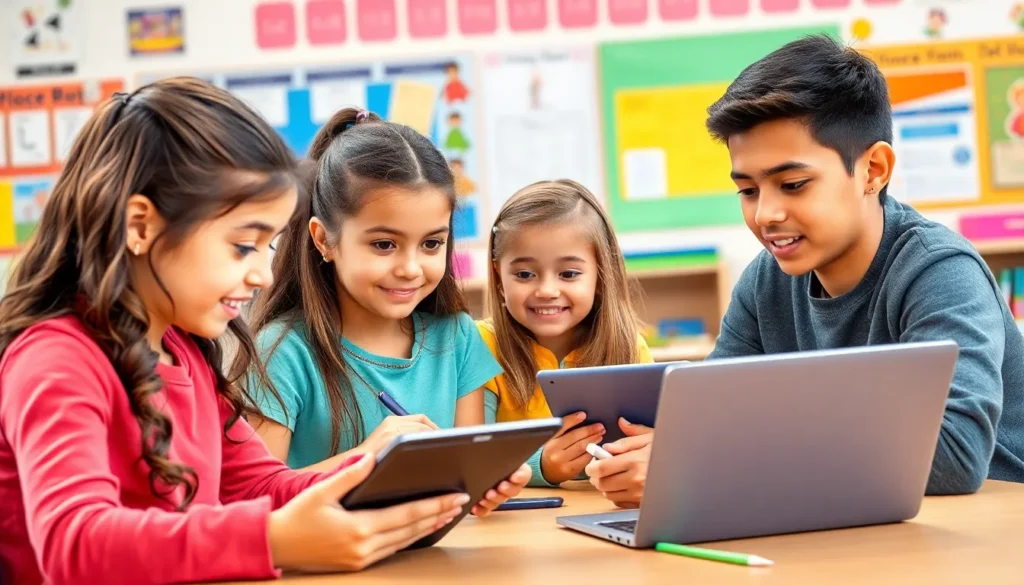In a world where students can learn everything from quantum physics to how to juggle flaming torches online, edtech programs have become the superheroes of education. They swoop in to save the day, transforming traditional classrooms into dynamic learning environments that engage and inspire. With a dash of technology and a sprinkle of innovation, these programs are reshaping how knowledge is delivered and absorbed.
Table of Contents
ToggleOverview of Edtech Programs
Edtech programs integrate technology into education, transforming traditional learning models. These programs enhance student engagement through interactive tools and resources. Learners benefit from personalized experiences and customizes pathways, catering to diverse learning styles.
Many edtech platforms offer features like gamification, which motivates students by making learning fun. Data-driven insights allow educators to assess student performance and adapt content accordingly. Schools and institutions often adopt Learning Management Systems (LMS) to streamline course delivery and foster collaboration.
Additionally, virtual classrooms enable remote learning, expanding access for students worldwide. Enhanced multimedia content, such as videos and simulations, enriches understanding of complex subjects. Interactive applications encourage critical thinking and problem-solving skills, preparing students for real-world challenges.
Notable examples of edtech programs include Google Classroom, which facilitates organization and communication. Platforms like Khan Academy provide free resources, promoting self-paced learning. Other tools, such as Flipgrid, enhance collaboration by enabling video discussions among students.
Edtech programs significantly impact teacher professional development, offering online training and community resources. These programs support continued education in teaching methodologies and digital literacy. Overall, they play a crucial role in shaping the future of education by making learning more engaging and accessible.
Types of Edtech Programs

Edtech programs encompass a variety of applications tailored to different educational needs. Each type leverages technology to foster effective learning experiences.
K-12 Education
K-12 education benefits significantly from edtech programs through tools designed to enhance classroom engagement. Platforms like Google Classroom and Seesaw streamline assignments, promoting communication between teachers and students. Interactive applications, such as Kahoot and Quizlet, encourage active participation and foster excitement in learning. Additionally, personalized learning platforms adapt resources to meet individual student needs, ensuring no learner is left behind. Data analytics tools enable educators to track student progress effectively, allowing them to make informed decisions regarding instruction.
Higher Education
Higher education institutions utilize edtech programs to enhance course delivery and student collaboration. Learning Management Systems like Canvas and Moodle enable the organization of course materials and facilitate communication among peers. Online resources, such as Coursera and edX, offer flexible, self-paced learning options catering to diverse schedules. Virtual labs and simulation tools provide hands-on experiences for students in fields such as science and engineering. Collaboration tools like Slack and Microsoft Teams foster teamwork, ensuring that students engage actively in their educational journeys.
Corporate Training
Corporate training employs edtech programs to improve employee development and skill acquisition. E-learning platforms like LinkedIn Learning and Udemy provide access to a vast range of courses, enabling employees to learn at their own pace. In addition, organizations utilize Learning Management Systems to track employee progress and manage training materials efficiently. Gamification elements in training modules enhance motivation and retention, keeping employees engaged. Finally, virtual reality programs offer immersive training experiences, preparing employees for real-world scenarios in a safe environment.
Benefits of Edtech Programs
Edtech programs offer numerous advantages that enhance educational outcomes. They transform traditional methods and engage learners in meaningful ways.
Enhanced Learning Experience
Interactive tools like gamification foster a sense of play in learning. Students retain information better through engaging activities that spark curiosity. Personalized platforms adapt resources to individual learning styles, ensuring each student receives the support they need. Data-driven insights provide educators with feedback on student performance, guiding effective intervention. Engaging content promotes collaboration among students, enhancing communication skills while working in groups.
Increased Accessibility
Technology breaks down geographical barriers, offering education to students worldwide. Virtual classrooms allow learners to access resources regardless of location, making education more inclusive. Flexible learning options cater to diverse needs, accommodating various schedules and commitments. Edtech tools support students with disabilities through specialized resources and features, empowering them to learn alongside their peers. Mobile access ensures that learners can retrieve information and continue education anytime, anywhere.
Challenges in Implementing Edtech Programs
Edtech programs face several challenges that can hinder their effectiveness in educational settings. These challenges include technological barriers and resistance to change.
Technological Barriers
Access to reliable technology serves as a significant hurdle for many educational institutions. Many schools lack the necessary infrastructure to support advanced digital tools. Limited internet connectivity impacts rural and underserved communities, making participation in edtech programs difficult. Additionally, outdated hardware and software can lead to compatibility issues, preventing the seamless integration of new solutions. Inadequate training on using these technologies may leave educators feeling unprepared. Ensuring that all students and educators have equitable access to necessary technology remains vital for successful implementation.
Resistance to Change
Resistance to adopting edtech can stem from various sources within educational organizations. Educators accustomed to traditional teaching methods may view new technologies as threats to their established practices. Parental concerns about screen time and the effectiveness of online learning can also contribute to hesitance. Furthermore, administrators might worry about the costs associated with implementation and training. Overcoming these obstacles requires clear communication about the benefits of edtech programs, along with dedicated support for those who feel uncertain about transitioning to more innovative teaching approaches. Building a culture that embraces change sets the foundation for edtech success.
Future Trends in Edtech Programs
Emerging technologies like artificial intelligence and machine learning are shaping the future of edtech programs. These innovations personalize learning experiences, adapting content to meet individual student needs. Virtual reality and augmented reality are transforming classroom dynamics, offering immersive experiences that enhance understanding.
Increased integration of analytics tools will provide educators with deeper insights into student performance. Predictive analytics can identify trends, allowing for timely interventions. Enhanced collaboration tools are also expected to evolve, fostering communication between students and educators in real-time.
Mobile learning continues to grow, enabling access to education anytime, anywhere. This trend supports flexible learning, catering to diverse lifestyles and commitments. Content delivery via mobile apps allows students to engage with materials on their terms.
Microlearning is gaining traction by offering bite-sized learning opportunities that fit into busy schedules. This approach enhances information retention and keeps students engaged with quick, focused segments. Asynchronous learning will also expand, accommodating different learning paces.
Gamification remains key in driving student motivation. Elements like rewards and challenges create an engaging environment that encourages participation. Furthermore, social learning platforms foster peer collaboration, enhancing the educational experience.
The rise of competency-based education emphasizes mastery of skills rather than time spent in class. This trend supports individualized learning paths, allowing students to progress based on demonstrated understanding. Open educational resources will continue to democratize access to high-quality materials, leveling the playing field for learners worldwide.
Investment in at-home learning technology will likely increase, preparing students for blended learning environments. Thoughtful implementation of these programs may lead to broader educational equity. As these trends unfold, the landscape of edtech programs will continue to evolve, enhancing educational outcomes.
Edtech programs are revolutionizing education by making learning more engaging and accessible. As technology continues to evolve the potential for personalized and interactive experiences grows. These advancements not only enhance student engagement but also provide educators with valuable insights to improve teaching strategies.
Despite the challenges faced in implementation it’s clear that the benefits far outweigh the obstacles. As schools and organizations embrace these innovative tools the future of education looks brighter than ever. The ongoing integration of emerging technologies promises to further transform learning environments and empower learners worldwide.




